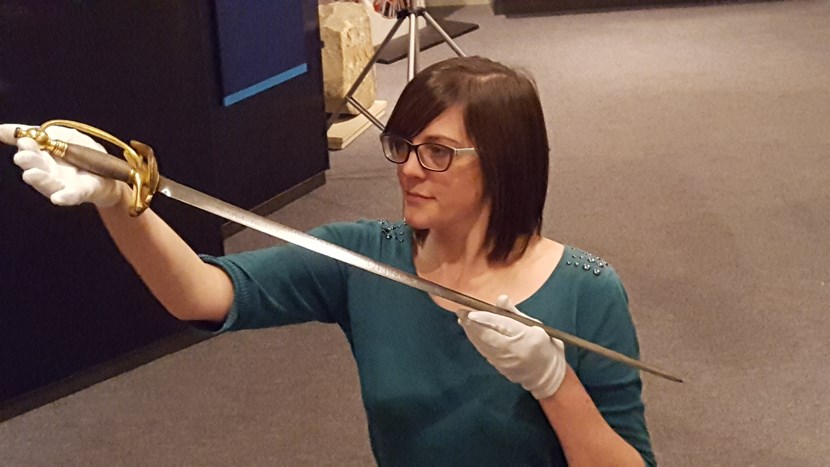
18 Oct 2016
Sword of real life Sharpe goes on display in Leeds
A sword which once belonged to a real life Sharpe, who worked his way up through the ranks more than 200 years ago, has gone on display at Leeds City Museum.
The historic cavalry blade was once held by Leeds soldier Captain William Jackson, and was presented to him by the loyal soldiers he commanded in 1800 for his “enduring attention to them in his duty”.
Much like Bernard Cornwell’s eponymous hero, Captain Jackson was a tradesman who rose to become a popular officer in the Leeds Volunteer Infantry.
The unit was formed in 1794 during the height of the War of the First Coalition, and was charged with defending Yorkshire against the threat of a French invasion which never came.
Before signing up, Captain Jackson is believed to have lived on Briggate, and trade directories show he may later have worked as a tobacconist- a job which, along with his status, could have helped him to become popular among his fellow soldiers.
On display in the museum’s Leeds Story Gallery, the inscription running along the sword's blade reads: “This sword was presented by the non-commissioned officers, drummers and privates of the South Battalion of the Leeds Volunteer Infantry to Capt Jackson as a mark of gratitude and respect for his soldier like enduring attention to them in his duty as their adjutant”.
The Leeds Volunteers were never called into action, but carried out regular military exercises and helped put out fires in the area. A painting showing them parading on Wakefield’s Heath Common is also on display alongside the sword.
Kitty Ross, Leeds Museums and Galleries' curator of social history, said: “From what we know about Captain Jackson, he was someone who worked his way up through the ranks rather than starting off as a wealthy gentleman, which may have partly accounted for his popularity with his men.
“Presentation swords connected to English volunteer regiments are fairly rare and, even though Captain Jackson’s men did not see combat, he must still have inspired a great deal of loyalty and devotion among the troops for them to have awarded him with a blade like this.
“We’re very fortunate to have the opportunity to tell the story of a man who was clearly a very popular and inspirational figure by having this historic sword on display.”
The Leeds Volunteers disbanded in 1808 and were replaced by the Leeds Local Militia, a unit Captain Jackson continued to be involved with.
His death was later reported in the Leeds Mercury on September 21, 1822.
Councillor Brian Selby, Leeds City Council’s lead member for museums and galleries, said: “Captain Jackson must have been an exceedingly popular commanding officer and his rise through the ranks is a stirring tale, so it’s a fitting tribute that his sword is now on display in his home city.
“Exhibits like this help us to tell some of the stories behind the many unique characters who have contributed to our city’s rich history over the centuries and to ensure their legacy lives on.”
Captain Jackson’s sword was purchased with the help of the Friends of Leeds City Museum.
For more information about Leeds CIty Museusm, visit: http://www.leeds.gov.uk/museumsandgalleries/Pages/Leeds-City-Museum.aspx
ENDS
For media enquiries, please contact:
Stuart Robinson
Communications Officer
Leeds City Council
Tel: 0113 224 3937
Email: stuart.robinson@leeds.gov.uk
For media enquiries contact:
Leeds City Council Communications team
communicationsteam@leeds.gov.uk